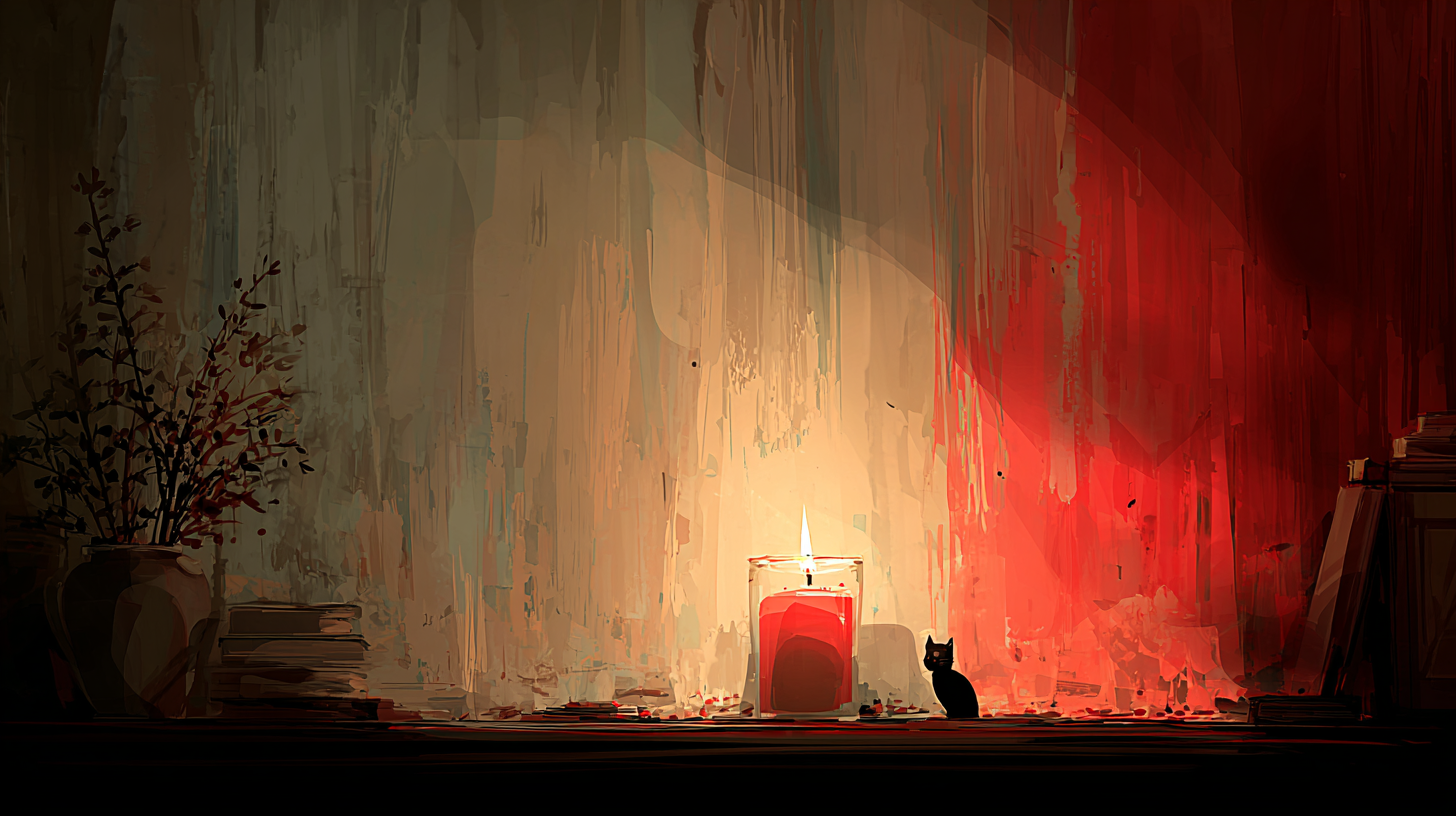“Flame” means the bright part of a fire or to burn with a visible fire.
「flame」は、「燃えている火の光っている部分」や「火を出して燃えること」を表す言葉です。
以下は英単語 “flame” に関するストーリー型学習コンテンツです。まずは大枠の意味を理解して最後の文章で確認しましょう。
「flame」の主な意味(main meaning)
| 品詞 | 意味(簡潔な定義) | 発音記号(IPA) | 例文 |
|---|---|---|---|
| 名詞 | 燃えている火の明るい部分 | /fleɪm/ | The flame of the candle flickered in the wind. |
| 動詞 | 炎を出す、燃え上がる | /fleɪm/ | The dry leaves flamed up quickly. |
「flame」の語源(etymology)
「flame」はラテン語「flamma(炎)」に由来します。「燃える」「明るく光る」という核のイメージがあり、そこから「炎」「燃え上がる」などの意味になりました。
「flame」の類義語(synonyms)
| 類義語 | 例文 |
|---|---|
| blaze | The campfire blazed brightly in the dark. |
| flare | A sudden flare lit up the sky. |
| fire | He stared into the fire, lost in thought. |
| glow | The coals still glowed after the fire died. |
| ignite | The spark ignited the gasoline instantly. |
「flame」の反義語(antonyms)
| 反義語 | 例文 |
|---|---|
| extinguish | The firefighters extinguished the flames quickly. |
| smolder | The wood smoldered without any visible flame. |
「flame」のコロケーション(collocations)
| コロケーション | 例文 |
|---|---|
| burst into flames | The car burst into flames after the crash. |
| flames rise | Flames rose high into the sky. |
| bright flame | She lit a bright flame with a match. |
| dancing flames | They watched the dancing flames of the fireplace. |
| put out the flame | He put out the flame with water. |
「flame」の2項表現(binomials)
| 表現 | 例文 |
|---|---|
| fire and flame | The house was destroyed by fire and flame. |
| smoke and flame | Smoke and flame could be seen from the distance. |
英語ストーリー(english story)
タイトル: The Fire Drill
It was a quiet afternoon in the office when suddenly, the fire alarm rang. Everyone looked at each other in surprise. Sarah stood up and shouted, “This must be a drill! Let’s stay calm and head to the exit.”
As they walked toward the stairs, a small flame was spotted near the kitchen. It wasn’t part of the drill. Someone had forgotten to turn off the coffee machine, and now a paper towel had caught fire. The flames rose quickly, and panic began to spread.
John, who had been trained in safety procedures, ran to get the fire extinguisher. He aimed carefully and put out the flame before it could burst into flames and cause more damage. Smoke still filled the air, and some smoldering items glowed in the kitchen.
After the incident, the team gathered outside. “You really saved the day,” Sarah said to John. “You acted faster than a firefighter.”
“I just didn’t want the place to turn into fire and flame,” John replied, trying to lighten the mood.
They all laughed, still feeling the heat of the recent event. The manager thanked everyone for staying calm and announced that a new fire safety training would be held next week.
From that day, everyone remembered how quickly a small flame could become a blaze and why it’s important to act fast — and stay calm.
和訳
タイトル: 火災訓練
ある静かな午後、突然オフィスに火災警報が鳴り響いた。みんなが驚いて顔を見合わせた。サラが立ち上がって言った。「これは訓練に違いないわ!落ち着いて出口に向かいましょう。」
階段へ向かって歩いていると、キッチンの近くで小さな**flame(炎)**が見つかった。それは訓練ではなかった。誰かがコーヒーメーカーを消し忘れ、ペーパータオルに火がついてしまったのだ。Flames rose(炎が上がり)、一気にパニックになりかけた。
安全訓練を受けていたジョンが、消火器を取りに走った。彼は慎重に狙いを定めて、すぐにput out the flame(炎を消した)。もし遅れていたら、すぐに**burst into flames(火に包まれた)**かもしれなかった。
煙が部屋に残り、一部の物はまだ**smoldering(くすぶって)**いた。
その後、みんな外に集まった。「あなたのおかげで助かったわ」とサラがジョンに言った。「まるで消防士みたいだった。」
「**fire and flame(火と炎)**に包まれるのはごめんだよ」とジョンは冗談めかして答えた。
皆が笑い、まだ事件の熱を感じながらも、マネージャーが感謝の言葉を述べ、来週新たな火災安全訓練を行うことを発表した。
あの日以来、皆は小さな炎がすぐに**blaze(炎)**になることを忘れなかった。
「flame」のQ&A
- Q「blaze」と「flame」の違いは何ですか?
- A
「blaze」は「flame」よりも大きく激しい火を表します。たとえば、建物が激しく燃えているときには「blaze」が使われることが多いです。
- Q「flare」と「flame」はどう違いますか?
- A
「flare」は一瞬強く明るくなる光や火を指し、「flame」は継続的に燃えている炎を意味します。flareは突然の明るさ、flameは持続的な炎です。
- Q「ignite」はflameと同じ意味ですか?
- A
「ignite」は「火をつける」「点火する」という動詞で、flameの名詞としての意味とは異なります。igniteは火が始まる瞬間を強調します。
- Q「extinguish」はflameの反対語ですか?
- A
はい。「extinguish」は「火を消す」という意味で、「flame」のように火がある状態を終わらせる行為を指します。正反対の意味になります。
- Q「smolder」はどうしてflameの反対になるのですか?
- A
「smolder」は炎が見えずに、くすぶるように燃える状態を表します。flameが見える明るい火なのに対して、smolderは目に見えにくい静かな燃焼を指すため、対照的です。
- Q「burst into flames」はどんな状況で使いますか?
- A
「burst into flames」は何かが突然火を吹いて燃え始める状況で使います。例えば、車が事故後に急に燃え上がる場合などです。
- Q「put out the flame」はどういう意味ですか?
- A
「put out the flame」は「火を消す」という意味で、消火の動作を表します。たとえば、ロウソクの火を息で吹き消すときなどに使います。
- Q「dancing flames」とはどういう意味ですか?
- A
「dancing flames」は炎が揺れながら燃えている様子を詩的に表現した言葉です。暖炉やキャンプファイヤーなどで炎が風や空気の動きで揺れているときに使います。
- Q「flames rise」はどんな場面に使いますか?
- A
「flames rise」は火が上に上がっていく様子を描写する表現です。火災の現場などで炎が高く立ち上っている様子を表します。
| 類義語 | 意味・定義 | flame との違い・ニュアンス | 例文 |
|---|---|---|---|
| fire | 火、火災 | flame より広義の概念で、火全体や火事を指す。 | The fire spread quickly through the building. |
| blaze | 激しく燃える炎 | flame より大規模・強烈な炎を表す。 | A blaze engulfed the warehouse. |
| flare | 一時的に強く燃える | flame よりも一瞬の爆発的な炎、または「感情の爆発」にも使う。 | Tempers flared during the argument. |
| glow | 柔らかく光る炎/残り火 | flame が「燃える炎」なのに対し、炎の残り・やさしい光を表す。 | The glow of the campfire lit up the night. |
| spark | 火花、小さな発火 | flame よりも始まりの火・小規模な点火のイメージ。 | A single spark started the wildfire. |



コメント